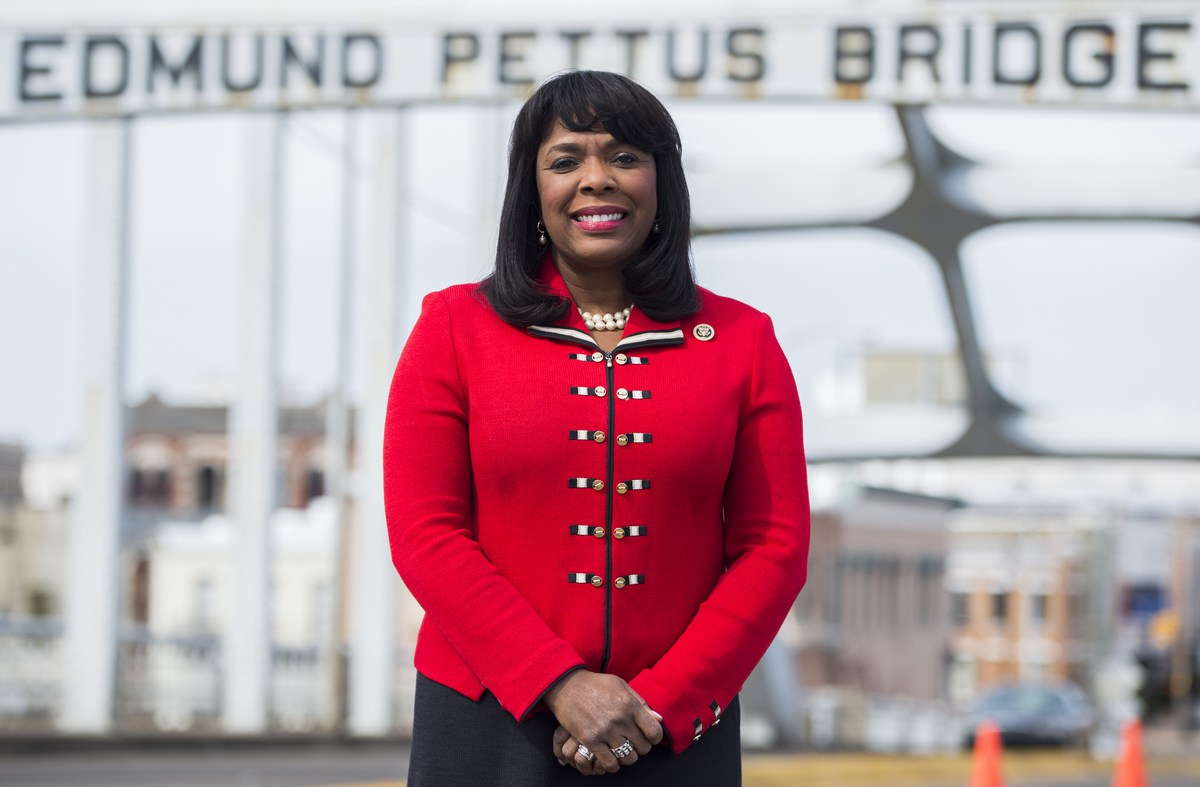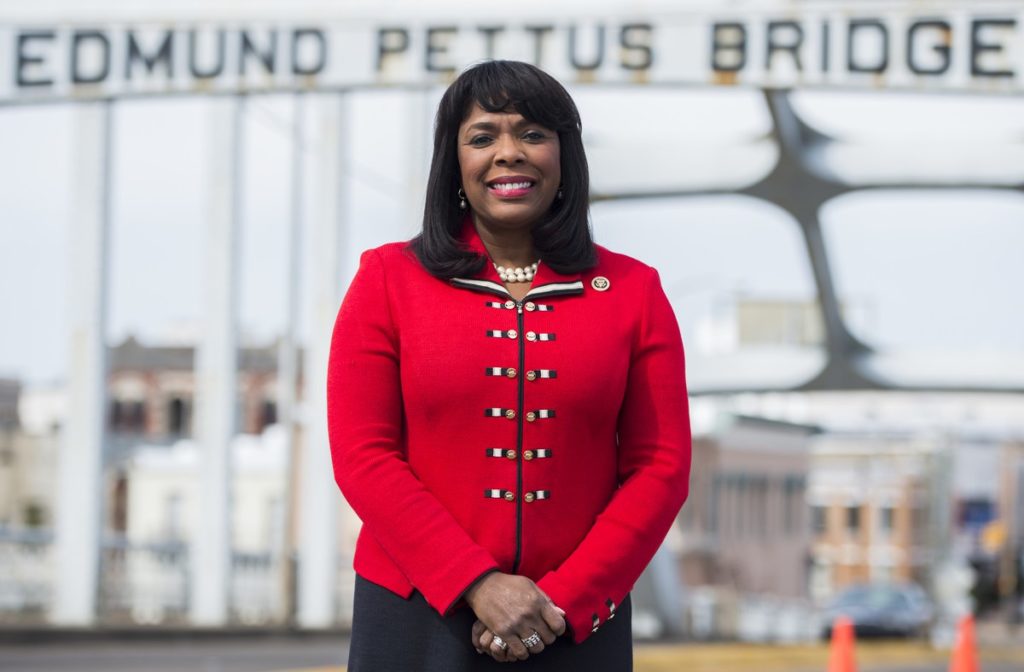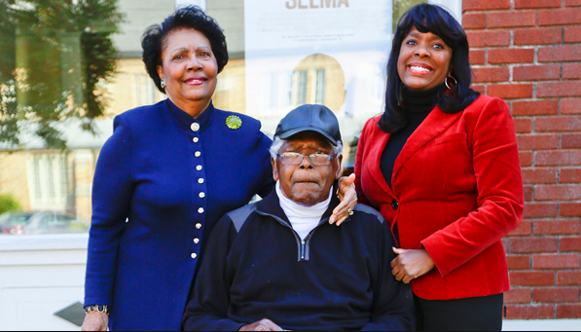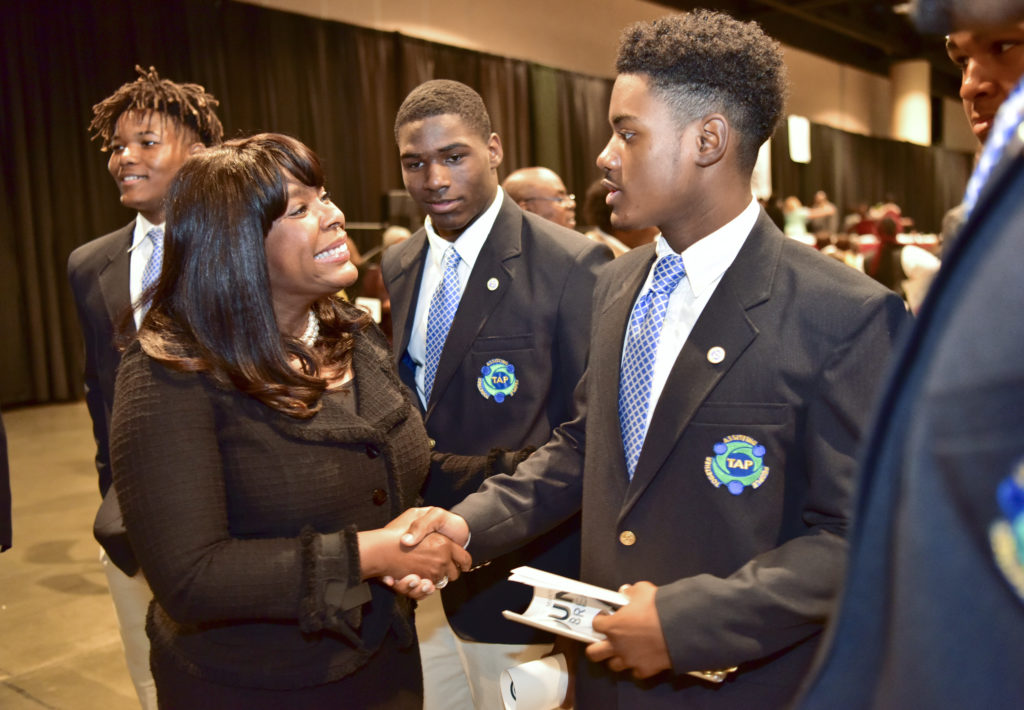
By Barnett Wright
The Birmingham Times

Congresswoman Terri Sewell’s very first job was as a storyteller at the public library in her hometown, Selma, Ala.
“I loved to talk. Can you believe that?” she says with a laugh.
The eight-year-old did more than talk—she dreamed big.
“I remember seeing the Leaning Tower of Pisa in a book and not knowing how I was going to get there, but I knew in my heart that I was going to get there,” said Sewell during a recent interview. “I think that the thing parents and communities can give children is the ability to dream a dream and to know in their hearts that they can achieve that dream.”
Sewell not only visited the Leaning Tower of Pisa in Italy but also reached the hallowed halls of U.S. Congress as the first African-American woman to ever serve in the Alabama congressional delegation.
In early-January, she was appointed to serve on the powerful U.S. House Committee on Ways and Means, the chief tax-writing committee of the House of Representatives.
Last week, Sewell was among more than 70 House Democrats who did not attend the inauguration of President Donald Trump. She said she would not attend because of Trump’s “blatant disrespect … toward American civil rights icon, my colleague, friend, and mentor, the Honorable Rep. John Lewis.”
With a new administration now in the White House pledging to erase gains achieved by former President Barack Obama, many believe Sewell’s voice is needed now more than ever.
No one is better suited and intellectually equipped for the challenges in Washington, D.C., over the next four years than the self-described “black girl from Selma.”
“I believe that her presence in the U.S. Congress at this time gives a lot of people more confidence in the future of our country than we would have were she not there,” said Birmingham attorney Jim Rotch, of Bradley Arant Boult Cummings LLP, who first met Sewell when she was still a law student and planning her career in Alabama.
“I was greatly impressed then with her strong intellect, her magnetic personality, and her passion to make the world a better place,” he said.
Ever-Vigilant
Sewell is well-aware of what the country faces—and what’s at stake.
“I think it’s going to be more incumbent upon us to be more engaged in this new incoming administration,” she said. “Progress is always fragile, and every generation has to lay claim to it, to protect it, and to further that legacy. I just think that, now more than ever, with a Republican-led, House, Senate, and White House … it’s going to be important for us to be ever-vigilant in protecting the fragile progress we have made and for us to continue to make headway.”
Sewell (D-AL) is serving her fourth term representing Alabama’s 7th Congressional District. She has held several leadership positions, including Freshman Class President for the 112th Congress, and she sits on the House Permanent Select Committee on Intelligence.
“I think it’s probably more important than ever [for her to be in Congress], to be honest,” said Birmingham attorney Doug Jones, a shareholder at Jones & Hawley PC. “She represents a district whose voice is going to need to be heard loud and clear in this administration and with this particular Congress. I think she has had, and has demonstrated, the ability to reach out and talk to people across the aisle, and she has the respect of the other members of the Alabama delegation.”
Adapting to the new political environment, Sewell said, means “being more engaged, more civic engagement, and being more in-your-face.”
“I mean, look, I didn’t vote for this president, but elections have consequences,” she said. “And while I didn’t vote for [Trump] and my choice for attorney general wouldn’t be [Alabama Sen.] Jeff Sessions, the reality is that we live in this country, and we lay claim to the progress that has been made when it comes to civil rights and human rights.
“I think we have to hold this administration’s feet to the fire and hold them accountable for protecting the precious civil and human rights that people in this district fought so hard to get. I personally will see it as a direct assault on the people of this district if those rights are compromised in any way.”
Daddy’s Girl

Sewell, 51, credits her family with her desire to achieve and succeed—and that family includes her extended community.
“I feel very blessed to have grown up in a community that nurtured me,” she said. “Yes, I had parents who were educators, and everything they taught me was reinforced by the community I grew up in. At every turn—from my Sunday School teacher to my Girl Scout troop leader to my debate coach—I felt very nurtured. I felt like that community put its heart and soul into me. They told me I could be somebody, I believed them, and every step of the way they’ve shared in my success.”
Sewell was the first black valedictorian of Selma High School in 1982. She graduated with honors from Princeton University, where she became friends with Michelle Robinson Obama. She’s also an honors graduate of Oxford University. And she received her law degree from Harvard Law School, where she was a classmate of Barack Obama.
“I was very blessed to have a wonderful role model in my mother,” Sewell said. “She was the first African-American woman to sit on the Selma City Council, a position she held for many, many years. My mom also was a librarian, and some of my earliest memories are of my mom stressing the importance of education and reading. If I brought home an A-minus in high school, college, or wherever I was, she’d say, ‘Did someone in that class make an A?’ If I said, ‘Yes,’ she’d say, ‘Well we have work to do, don’t we?’”
Her mother, Nancy Gardner Sewell, was a high school librarian. And in 1993 she was the first African-American woman elected to Selma’s City Council, where she served 11 years.
Terri Sewell is the oldest of three children; she has two younger brothers, who are twins. Growing up, she was a daddy’s girl—and nothing has changed.
Her dad, Andrew, 81, is known in Selma and throughout Alabama simply as “Coach Sewell,” the legendary basketball coach of the Selma High School Saints, winners of several statewide championships.
When Coach Sewell had a series of strokes that left him wheelchair-bound, Sewell left a New York–based law firm to be near her dad.
“It was a come-to-Jesus moment for me,” Sewell said. “I felt like if I’d made partner one time I could make it again. I also felt that I had one life to live, and I didn’t want to have any regrets. It’s one thing to send money home, and I was blessed to be able to do that, but it’s another thing to send yourself home. I’m the oldest and the only girl, so I decided to move back home and help my family with my father.”
Returning home led Sewell to join Birmingham–based Maynard Cooper & Gale PC, where she was the first black woman partner in the law office and distinguished herself as one of the only black public finance lawyers in the state.
“By that time, my dad’s condition had stabilized and my family was doing a lot better. How often do you have an opportunity to really give back to the people, the community that really nurtured you? To me, it was the opportunity to have a full-circle moment.”
For Sewell, giving back meant a run for Congress.
“That’s what motivated me to run. It was really the sincere, heartfelt gratitude I have for growing up in a small, rural community in Alabama,” she said. “I felt if folks got to know my story, they would see that I am the embodiment of the 7th Congressional District. And who could better articulate to my generation the concerns of the people of the 7th Congressional District?”
Working Together
Sewell’s body of work since being elected to Congress in 2010 is among the most impressive in Washington, D.C. Her first piece of successful legislation recognized the “Four Little Girls” killed during the bombing of Birmingham’s Sixteenth Street Baptist Church in 1963. The House of Representatives in 2013, 50 years after that tragic event, unanimously voted to bestow a Congressional Gold Medal, one of the nation’s highest civilian honors, upon Addie Mae Collins, Denise McNair, Carole Robertson, and Cynthia Wesley—some of the youngest victims in the struggle to ensure equal rights for all Americans.
In March 2015, Sewell was instrumental in getting President Obama to visit Selma during the 50th anniversary commemoration of Bloody Sunday and to speak later that month at Birmingham’s Lawson State Community College, where he addressed payday lending and the need for stronger consumer protections.
More recently, Sewell in March 2016 spearheaded the move to designate the Birmingham Civil Rights District as a national monument. She and Mayor William Bell spent countless hours working to gain support for and ensure passage of the executive order, which was one of Obama’s final acts as president.
Bell said, “It is critically important to have everyone working together for the good of the city of Birmingham, both locally and in Washington, D.C. With a unified front, we can do so much more, and the designation is an example of that. We went to Rep. Sewell and asked for her help by introducing the bill. It took a few meetings, but once she and her staff understood what we were trying to do, she introduced the bill. That gave us the leverage to then pursue the Presidential proclamation, which was ultimately successful.”
Early Start
Sewell’s days “start early and end late,” she said.
When in Washington, D.C., she typically is awake before 6 a.m. to begin juggling her responsibilities as a member of both Congress and the Democratic Party, which can involve fundraising. Before heading out, she spends the first 15 to 20 minutes of her day meditating and reading the Bible. Then a “20-minute workout, if I can,” she says, “and I’m in a car by 7 a.m., heading to my first meeting of the day at 8 a.m.”
She has caucus meetings at 9 a.m., committee hearings from 10 a.m. until noon, and meetings with constituents in between and whenever she can. This month, Sewell met with members of the Birmingham City Council.
“I told her in D.C. that she represents not only her district but also the state of Alabama very well,” said Birmingham City Councilman Steven Hoyt. “The city of Birmingham just happens to be one of the cities she represents, and she does an excellent job and is very in tune with the constituency she serves. It just makes you proud that she has had and has forged relationships with … members of the [Republican] Party, and has been able to meander her way into key congressional positions. I think we all owe a bit of indebtedness to her for her service and the spirit in which she serves.”
Sewell’s early afternoons are filled with meetings, with both constituents and staff about legislation. Then she’s on the floor of the House between 2 p.m. and 4 p.m. for votes. Late afternoons could involve attending receptions for causes like cancer research or other issues that matter to people in her district. Evenings often include dinners and speeches for other causes she supports, such as the United Negro College Fund (UNCF) or the Thurgood Marshall College Fund (TMCF). She is usually home by about 10:30 p.m.
After unwinding for about 30 minutes, she pulls out a binder to prepare for the next day.
“Every day, my office puts together a binder with my daily schedule and all the reading materials I need to prepare for the next day’s hearing or floor debate. That binder may have a speech I’m going to give on the floor of the House. My staff doesn’t always get my voice right, though, so I [sometimes] have to rewrite it,” Sewell said.
“Between 11 p.m. and 1:30 a.m., I do most of my prep work. Then I’m asleep by 1:30 a.m. and up by 6 a.m. to start all over again.”
On Thursdays, Sewell participates in a bipartisan, members-only Bible study group.
“It’s really been great,” she said. “It’s a good way to meet members across the aisle who share my faith . . . sometimes it’s just reading the daily word, and sometimes it’s reading from my Bible.”
Congress is in session Mondays through Thursdays or Tuesdays through Fridays, usually four days out of every week. On the other days, she’s back in Birmingham.
The Magic City

When Sewell is in Alabama, she stays on the go. Earlier this month, she arrived in Birmingham on a Saturday to run errands, visit constituents, and get her hair and nails done. Then she helped host U.S. Attorney General Loretta Lynch, who was the featured speaker at a Martin Luther King Jr. Day commemoration program at the Sixteenth Street Baptist Church. The next day, Sewell delivered greetings at the 31st Annual Martin Luther King Jr. Unity Breakfast. She doesn’t have much down time.
“Look, I love movies, I love the beach, I love books. Obviously, my mom was a librarian, so I [love] books. I have five books on my nightstand in Washington, D.C., and seven books on my nightstand here at home in Birmingham.”
Does she at least get a chance to treat herself?
“Oh, yes!” Sewell said. “I love Häagen-Dazs coffee-flavored ice cream.”
“I love my mom’s smothered pork chops, too. As a matter of fact, when I come home, don’t think she doesn’t have it for me,” Sewell said. “We all have to unplug and unwind. I do that. My birthday is New Year’s Day, so it was an honor and a privilege to watch Alabama beat Washington in the Peach Bowl. See, I try to mix business with pleasure. At the same time, you can’t do this job without unwinding. I’m very blessed to have a tight-knit family that allows me the solace and comfort of being at home.”
Her love for her job is very evident to anyone who watches Sewell engage with people.
“One of the things that endears me to Congresswoman Sewell is that she maintains a connection with the people,” said Odessa Woolfolk, president emeritus of the Birmingham Civil Rights Institute. “She doesn’t forget where she came from. And although she is a very accomplished woman, an intellectual, a lawyer, and all of that, she is a citizen of Selma, of Alabama, of the people.”
“I think she has represented us very well in Congress. She knows how to network, she works with people on both sides of the aisle, from all walks of life,” Woolfolk said. “She’s a person of great humility and charm. I think she is a very effective person, and we need to keep re-electing her.”
Sewell said, “I believe that my time in Congress is limited. I want to use every opportunity, every advantage, every resource I can to be able to advocate on behalf of all the people of the 7th District. I believe I’m just a custodian of this seat for a while, and I want that time to make a difference in their lives.”
Staff Writer Monique Jones and Correspondent Solomon Crenshaw Jr. contributed to this article.
This article was updated at 1:22 p.m. on 1/27/2017 to correct the law firm where Jim Rotch is an attorney.
Terri Sewell … in her own wordsRepresenting Alabama’s 7th Congressional District “It’s a huge honor, but it’s a huge responsibility. Everybody I know lives in my district—my mom and dad: Selma; my aunt: Montgomery; my brothers: Birmingham—so it’s a huge responsibility that I don’t take lightly. I feel very honored to have this opportunity for this period of time, for this season of time to just continue to be able to provide better opportunities and resources back home. “You can’t please everybody, but that doesn’t mean that you don’t go to the heart of where your people are. My people include everyone from the successful black family unit, to the single mother struggling to make sure she provides for her child, to the disaffected white steelworker who doesn’t have a job anymore, who is angry, and who probably voted for Trump. They’re all my people. “People have to know that you are with them, and you can’t do that just sitting in Washington, D.C. The best part of my week is coming back home. Home is where you get to really feel, touch, see, and be among the folks you represent. How can you represent them if you’re not walking among them and listening to their concerns so you can articulate that to the folks back in Washington, D.C.?” Meeting Constituents “I’m always very mindful of the fact that every encounter is an opportunity to inspire, to listen, to learn. Each encounter provides an opportunity to learn more about the concerns of the district. And each encounter provides an opportunity, hopefully, to inspire another generation of people to want to do better for themselves. This is something that’s never lost on me, as the first African-American woman to hold this position. That’s why I feel it’s both a wonderful opportunity and a huge responsibility. “I wear my womanness, my blackness with pride. I don’t shy away from speaking out and speaking up, and I don’t shy away from using the intellect that God has been so gracious to provide to me to also advocate. Every opportunity is an opportunity to advocate, right? An opportunity to do better.” Her Inspirations “My scheduler knows, my staff knows that the truest way to get me to do a speech is to tell me it’s in front of children, whether it’s at an elementary school, a high school, or a college. Why? Because I was inspired by [congresswomen]—the Shirley Chisholms, the Barbara Jordans. I wrote my senior thesis at Princeton on black women in politics and had a chance to interview Shirley Chisholm when she had just retired from Congress and was teaching at Mount Holyoke College. “When I was at Mount Holyoke visiting Shirley Chisholm, her assistant told me, ‘The congresswoman only has 30 minutes to give you, so are you going to be ready to get there and get there on time?’ I said, ‘Yes, ma’am. I’ll be there.’ I got there an hour early and had my little tape recorder ready. [Chisolm] was running late with her meeting, so she was only going to be able to give me 15 minutes. That was fine. I’d taken a train from New Jersey to Massachusetts, so whatever time she was going to give me I was going to get it. I walked into her office, she extended her hand, and I was weak in the knees because this was Shirley Chisholm, the first black woman to walk the halls of Congress, right? And, here I am, a student, a senior in college. I sat down, pulled my tape recorder out, and noticed that it had begun to snow. It snowed and it snowed—and what was supposed to be 15 minutes ended up being four hours with Shirley Chisholm.” ‘Unbought and Unbossed’ “When I am the most distraught and the most frustrated with the political process in Washington, D.C., because the gridlock is real, when I am at my lowest I walk by that glorious picture of Shirley Chisholm in the Capitol, the only portrait of an African-American woman in the U.S. Capitol. She has her hand on her hip and her finger pointed—‘Unbought and Unbossed.’ “They put [Chisolm] on the House Committee on Agriculture when she represented Brooklyn, N.Y. They did that to disrespect her, but what did she do? She carved out public assistance programs for food stamps and made that a part of agriculture. She took lemons and made lemonade. When I see that picture, I can’t help but get a pep in my step, get a glide in my stride because I know she fought the good fight, this woman. How dare I hold my head down low? It’s just inspirational to me.” Favorite Books “I think that if I had to choose one book, it probably would be ‘To Kill a Mockingbird’ because it’s by an Alabama writer writing about being a lawyer. There are so many parallels in that story to my life. But there are wonderful books like ‘The Bluest Eye,’ by Toni Morrison, that really helped me to see beauty in my own skin and that the darker that skin, the more beautiful that skin. “I’m an avid reader, and I love biographies. In ‘Team of Rivals,’ I see parallels between President Obama and President Lincoln, and so many other wonderful books are mirrors into people’s lives. I think that’s why I love biographies so much. On my nightstand at any given moment there are all kinds of books, from self-help to biography. I love mysteries, too. And I’m re-reading ‘Fences,’ by August Wilson. I put on ‘for colored girls who have considered suicide/when the rainbow is enuf,’ by Ntozake Shange, when I was at Oxford because I felt like I wanted to bring my culture to England. I love books. I could go on and on about books.” |
This profile is a part of a series of profiles by The Birmingham Times. To read our profile on Mayor William Bell here.




